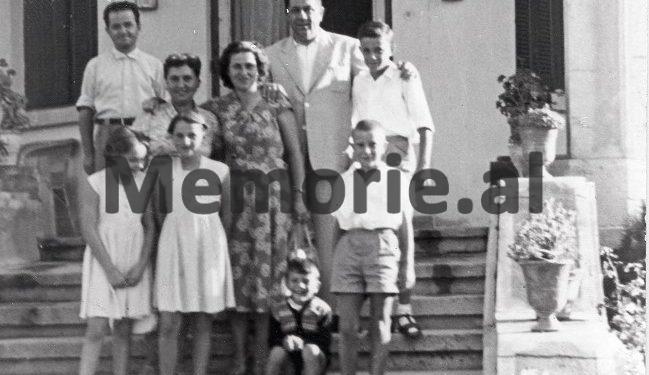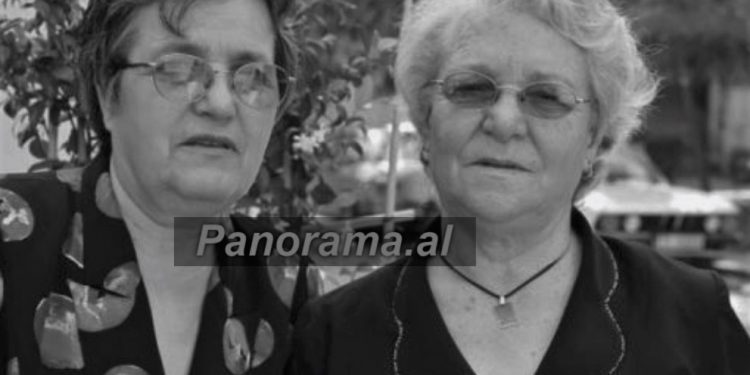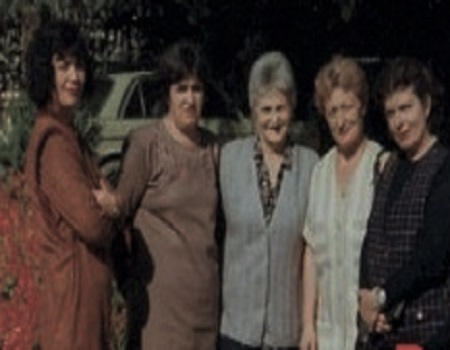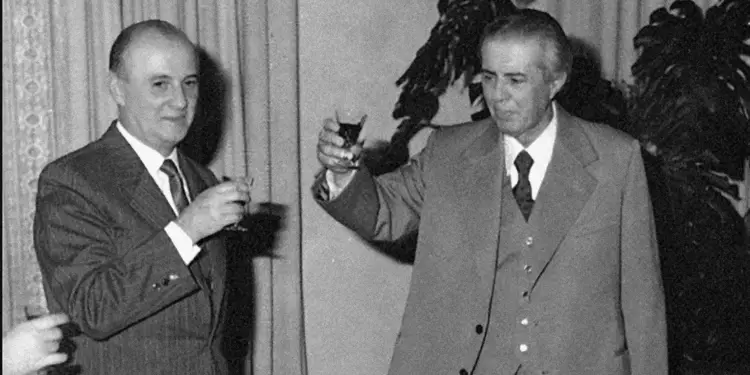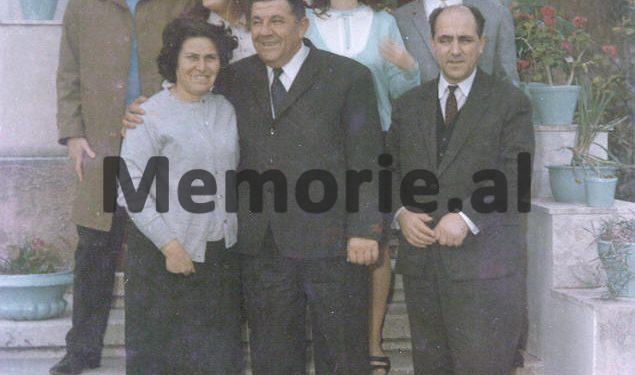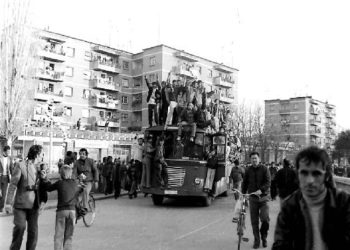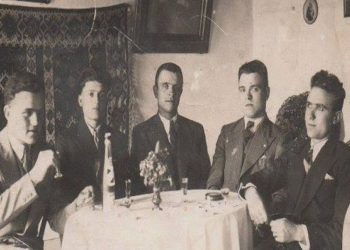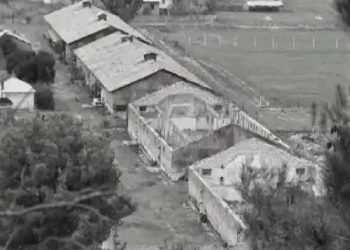By Ermira Isufaj
Memorie.al / Hatixe Duro and Ikbale Gjaçi, two former workers in the villas of the former ‘Block’ tell about the period when they served the communist leaders, starting with Ramiz Alia, Adil Çarçani, Hysni Kapo, Lenka Çuko, Beqir Balluku, etc. How did the former blockmen live, the chosen foods, while the crisis had plagued Albania…?! Fulfilling daily cravings, from pancakes to Chinese food….! Not everyone could step on their families! In the most armored area of the Albanian capital, where it was often forbidden to take a look, let alone cross the roadblocks or the controls of the persons who took care of the physical preservation and order of the former communist leaders.
There, both of them, Khadija and Ikbalja, had the daily routine of work. The presence among the wives and children of officials, the highest of the people’s power, could not fail to impose confidence, and at the same time, pressure from all four sides. Hatixe Duro and Ikbale Gjaçi started their work as governesses in the villas of the former communist ‘Block’, “walking” almost in the majority of the houses of the former officials of that regime, until they retired. They say that it was not an easy job, even though the efforts to do just the daily task were more than necessary, to keep the “head” and the workplace.
The long experience in the houses of the big ones of the communist state has not been without tension. Serving breakfast coffee and warm pancakes to Ramiz Ali, Beqir Balluku, Hysni Kapo or Lenka Çuko was more than a responsibility. It was often anxiety, lest a tremor of the hands, or a hasty movement, could become the cause of some unwanted situation or incident. Just like other times, the two governesses of the villas of the former ‘Blok’, became part of family joys, end-of-the-year holidays or the careful attention of politicians’ wives, which they decorated with various gifts for themselves and their families theirs.
Hatixe Duro: “How did I take care of Enver Hoxha’s Chinese doctors”?!
Ms. Hatixe, working in the villas of the former rulers of the communist regime was not an easy task. Besides professional responsibility, what other pressures did your job have?
Before I was appointed as a worker in the house of Beqir Balluk, the first communist functionary, in whose villa I worked for six months, my biography was passed through a sieve. At that time, all the trusted employees in the leaders’ villas were needed with clear biographies, and mine has stayed six months in a row, in the state offices, passing through careful filters, so much so that they managed to ask about me and family, even in my hometown, in the village. It was really a job with extraordinary responsibility, because I worked inside the houses of communist officials, I served them, their wives, and their children, of course with full readiness.
In my beginnings, I was a cottage worker and the tasks assigned to me were mainly related to washing the floor, the yard, washing clothes, ironing and many other household chores. Later, after specializing in a course for cooks, I positioned myself in this profile, cooking for many communist rulers over the years, at the same time, serving at the receptions of foreign delegations visiting our country, receptions that were mainly organized at the “Palace of Brigades”.
But even though somehow I and my colleagues were the trustees of the houses of these officials, security and control were primary for us as well. Every morning, before entering the “Block” villas, we showed the entry slip, which we presented to the post-block, and then we entered the respective houses, from 7:00 a.m. to 4:00 p.m. in the afternoon.
What do you remember from your first work experience?
I started work for the first time in 1965. I was replacing a cook who had taken vacation leave. That day a reception was organized in the Palace of Brigades. I served drinks to the guests present, ministers of popular power and some representatives of a foreign delegation. Immediately after this experience, I was sent to work as a governess in the house of the former Minister of Defense, Beqir Balluku. I stayed there for six months.
As a worker, I had a very correct relationship, with the whole family, but mainly with his wife, Saide Balluku. We were a total of three workers and a cook, serving at Balluk’s house. My job involved cleaning the house, furniture, yard, etc. I was only 23 years old and the beginning was very difficult, full of emotions.
Was equality felt in the way they treated you simple workers who served communist officials and their families?
Personally, I felt appreciated for my work. I knew the dangers, so I always tried to do the tasks of the day, bent, obedient and without any excessive curiosity, to learn what was happening in the villas where I served, the entrances or exits of certain people, family situations, or unwanted politics, which could happen and were reflected at home, such as nervousness or raising the voice.
If I spread the word, or took too much interest, the consequences would be inevitable. Therefore, while maintaining these principles, I have not lacked respect from them. Beqiri often sat with us workers and drank coffee together. While, other rulers often did not separate us from their family joys. They were careful, giving us gifts for themselves and their families during the end of the year holidays.
After Beqir Balluk’s villa, you moved almost to the vast majority of the former Block’s villas, right?
Yes. I worked in many of them, but these moves were made not without recommendations or good reputation. After Beqir Balluku, I worked in Hysni Kapo’s house. They were a respected family, from which I also keep very beautiful memories. Vito Kapo liked my handiwork very much and asked me to embroider two pairs of sheets for his daughter, Vera, when she got married.
It turned out to be a very nice kit, and I worked on it day and night until I did something good. Vito liked my work so much that he suggested my name to Manush Mufti’s wife as a lady worker. At the latter’s villa, I worked even longer, again as a worker, until the moment I decided to attend culinary school, I received all seven categories, along with the title of professional chef.
Mrs. Hatixe, which do you remember as a difficult moment during the years of your work in the villas of former communist officials?
It was a moment that I will never forget. It was the New Year’s holiday and in the “Palace of Brigades”, a reception of a Portuguese delegation was being organized. In charge, was Ramiz Alia, while we on the staff, in the morning, had been told that it was just a cocktail? I had prepared some light antipasti with salami and meatballs, fresh cheeses, since of course, for the dishes of this nature, or even for the rulers of that time, the supply of products and raw materials was made entirely in the “Blok” warehouse where you couldn’t even find swallow’s milk. Everything special. I was informed in the last minutes that it was not a banquet, but a real dinner for six people.
An incredible tension. Fear took over my body. What could I do in such a short time?! As for the companions of Ramiz Ali, they almost fainted before the fact, how they had to explain to him that the dinner could not be reached. In those moments, every bad consequence swirled in my head, so I gathered myself and got to work. While the banquet was being laid and the drinks were being served, I started preparing the dinner, from the soup, the meat, the fillets, the desserts and within 45 minutes, I succeeded. Everything was ready. That tension and fear I experienced then, I can never forget.
You served as a cook even at the time when some Chinese doctors came to Albania to see Enver Hoxha’s health condition…?!
A separate episode, this is also part of my long work experience. I remember that there were five Chinese doctors who came to visit the leader, Enver Hoxha, at the time when his health condition had deteriorated. They stayed 14 days in Tirana and almost every day, I cooked for them, even Chinese pancakes.
It never occurred to me that I could make Chinese food, but here I am. I made some dough fillings with meat, in strange shapes, which I then put in boiling water for a few minutes. I served them, as desired, with cheese, or simply marinated. I cooked many Chinese recipes, while the doctors were always satisfied with everything I prepared.
When did you work at Ramiz Ali’s house and at Lenka Çuko’s?
I remember when I was working for Ramiz Alia, I served him coffee every morning, while warm pancakes were his favorite. He always thanked me for my cooking, as his wife, Semiramis, was an extraordinary woman. At every party, she would not forget to give me gifts for my family and it made me feel good and appreciated. They were by no means lonely people. Even in the villa where Lenka Çuko lived, I had a great time. Every time she returned from work, she would always come to greet us, the staff of workers and cooks, who worked for her.
In certain happy, family moments, she took us to dance together with Naunka Bozo. Although they could often provoke me in different ways, by placing money, jewelry or valuables in the drawers or on the nightstands, I smelled the traps and always avoided them. The daily life of my work over the years, until I retired, has had both responsibility and fear together. But it was my care, my vigilance and the need to support my family with that salary, that every time pushed me not to get involved in delicate situations, always looking only at the tasks that were assigned to me.
Iqbale Gjaçi: “Adil Charçani, broke the advice of the nurse”!
Ms. Iqbale, initially you worked in the food warehouse of the former ‘Block’, which had everything required by the suppliers for the houses of the high communist authorities. What did you notice during the years you worked there?
I worked in the food warehouse of the former “Blok” for almost three years. What I have not passed through the hands, goods and products, which I had never seen before. Every assortment was found in that warehouse, but of course, it was intended only for the established families of communist functionaries, or for the “Palace of Brigades”, where various state receptions were organized.
Only swallow’s milk, you could not find in our warehouse, because every other product, even dried fruits, fish fillets, was there. We fulfilled the requirements, which were brought to us in writing by the suppliers of the leadership villas, but each transition was done very carefully. A lot of vigilance was shown, in the weight of the food, the quality was checked again, since any mistake was unforgivable.
How did you then move to the position of governess, in the villa of Adil Charçan?
At the villa of Adil Çarçan, I worked from 1986, until the beginning of democracy. Initially, I was sent as a worker to his house, saying that I would only stay for two weeks, but the stay lasted longer than I had anticipated.
Apparently, they liked my working method, the correct relationship I had with the staff of workers there, but also the Çarçani family itself. The jobs I did were different, from cleaning, washing clothes in the washing machine; I often even cooked in the family kitchen, which was located in the basement.
Do you remember any moments apart from others, in that house?
I worked at Adil Charçan’s house, during the time when he was diagnosed with diabetes. Every day, the nurse came to the house, who weighed him, everything he would consume during the meals of the day. Often, he also determined the menu, because such was the disease. By following that diet, it was possible to maintain blood sugar levels. But, I often remember the fact that as soon as the nurse finished her work schedule and left, Adili came to the kitchen, greeted us and asked to eat again, some delicious dish, which he liked very much.
The next day, when his blood glucose was measured sober by the nurse, his sugar level was quite high, which often endangered Adil’s health. There was a lot of noise. The nurse would criticize the staff, but things would repeat themselves. Adili repeated the same thing every time the paramedic left. Maybe because he was a good taster of food.
His wife, Havana, has been shown as a serious woman. What was your relationship with him?
For the very position she had, as a prosecutor, she could seem harsh, but with us, the staff of housekeepers, she was correct, and that was enough for us. I was very careful in my work, so as not to give rise to contradictions. Even when I dusted, I carefully moved every piece of furniture and put it back in the same place. Many of my colleagues have had problems, precisely because of the fact that why things are moved around the house?!
It happened to me once, that while I was putting the clothes to be washed in the washing machine, a colored sock was mixed with them and all the clothes turned black. I cried all day. I locked myself in the basement below because I was afraid of the consequences. In addition to the clothes, I was worried that Adil’s wife wouldn’t find out that it was going to be a night out. Thank God, a colleague of mine was willing to help me. He put them in chlorine, then in a bleach solution and they were as good as new. I will never forget the tension I experienced that day.
If we can make a comparison of work experiences: you worked both in the years of dictatorship and in the post-communist period. Where are these experiences shared?
Each of them had its own specificity. In the first experience of the years of work, whether in the “Palace of Brigades”, in the food warehouse, in the former “Block” or in the house of Adil Çarçan, for many years in a row, things were much suppressed. I tried to do my job and not interfere with words or conversations that could be expressed between family members during the day. If I did the opposite, who knows in which area of Albania I would be killed, along with my family.
Keeping my head, my workplace, I always pretended I didn’t understand or didn’t hear. Such was the system, I could not act differently. Whereas, after 1991, the fragile beginnings of democracy and onwards, I worked mainly in government holiday villas, in the Dajti mountain area. I worked for some time for former Prime Minister Ilir Meta and his family. I have served breakfast, coffee, fruit juice, or even other food meals of the day, to the entire Meta family.
The situations were less tense. We didn’t have that old pressure and fear of not opening our mouths to speak, of being shy, of saying the wrong or inappropriate things. With Monika Kryemadhi, we workers often drank coffee together, discussed our family problems and we found their support for certain issues. Memorie.al




